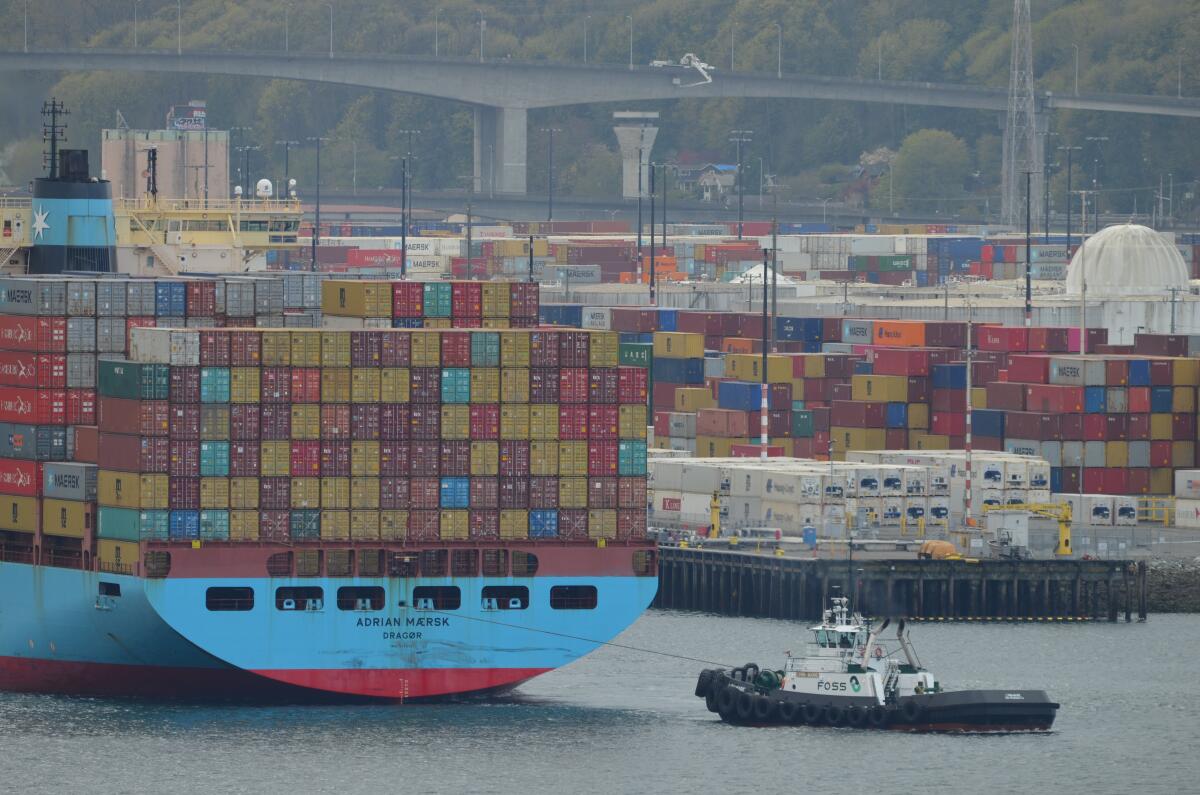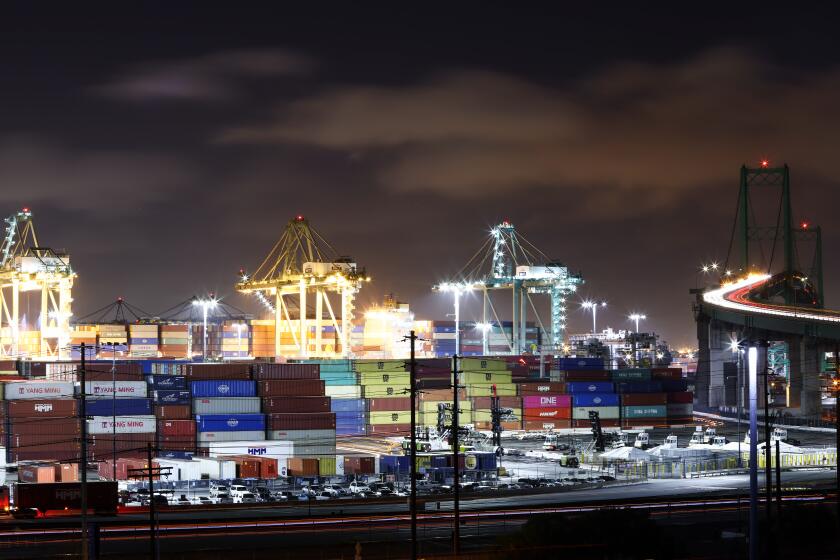Biden had better get the ports back to work

- Share via
Port logjams and freight costs may sound like speakeasies in Silver Lake, but the pain in our wallets has forced us to brush up on these and other global supply chain issues that are driving the fastest inflation increase in 30 years. Much less fun than a speakeasy.
So while Democrats are taking a victory lap after passing a much-needed $1.2-trillion infrastructure package, the fact that 70% of Americans rate the economy negatively is a sign that their parade route needs to be very short. Folks may understand the pandemic put a kink in the global supply chain, but they don’t really care. They just want the price of groceries to come down.
The great American supply chain has hit the skids, and a Times reporter took a cross-country trip to check out the economic mayhem.
Which brings me to this: If President Biden thinks he’s in the hot seat now — when half of Americans blame him for rising costs — next summer might feel like pure hell.
On July 1, 2022, the contract for West Coast dockworkers is set to expire, and there’s no new contract yet agreed upon. Since 1996, every negotiation between the International Longshore and Warehouse Union (ILWU) and the Pacific Maritime Assn. has come with work slowdowns. Consider what a decrease in productivity would do to an economy already saddled with a near-record logjam. It’s downright frightening. With the backlog combined with a labor movement that is changing the culture of work, the union has way more leverage today than it did the last time the parties were in contract negotiations, six years ago.
Opinion Columnist
LZ Granderson
LZ Granderson writes about culture, politics, sports and navigating life in America.
The Biden administration needs to do more than just keep tabs on the situation. Resolving the trouble at the ports should be the main priority the way the pandemic was in the early months of the administration.
Last time around, after a federal mediator failed to resolve the standoff between the ILWU and port managers, President Obama had to send Labor Secretary Tom Perez to stop the standoff, which had forced 29 ports to shut down.
“It was very stressful,” Perez told me Wednesday. He said one of the federal government’s tools to resolve such a dispute is the Taft-Hartley Act, which bars some strikes and other labor tactics — a blunt instrument. “We did not invoke Taft-Hartley, nor did we need to or threaten to. The parties were having struggles, but there was mutual respect. We allowed collective bargaining to rule the day, the parties involved benefited equally, and we didn’t have to invoke what people call the ‘nuclear option.’ ”
It would not be a good look for Biden, who touts his White House as one of the most pro-union administrations ever, to turn to a law that would force dock union members back to work if things turn ugly. Not to mention that if Biden is viewed as a bad-faith actor in these negotiations, that could be problematic for his administration in 2024 when the contract for the International Longshoremen’s Assn. — which stretches from Maine to Texas — expires and he’s running for reelection.
So can the president make a strong arm feel like a warm embrace for all involved? Maybe not.
For Biden, who was endorsed by the ILWU, there really isn’t a big win for him politically either way. If he leans on the union, which is fighting increased automation that would lead to job loss, he’ll be accused of not caring about working-class families. Appear to side with workers, and he’ll appear anti-business.
Still, it’s worth the risk, as he may recall from his time as vice president. Back in 2015, when Perez had to step in, an industry study estimated that prolonged port shutdowns cost the economy nearly $2 billion per day. Today the port bottleneck gets a large swath of the blame for the anemic GDP growth rate of 2% in the third quarter, after the country enjoyed a 6.7% rate in the second.
If negotiations between ports and dockworkers go south, “inflation” may be too weak of a word to describe the effect on the economy.
Unfortunately there won’t be a silver bullet. Remember this fall when Biden announced a deal to have the ports run 24/7 in an attempt to ease the backlog? Well, apparently there weren’t enough truck drivers and nighttime warehouse workers to make the move effective, which makes sense when you remember that lots of employers say they are struggling to find workers. There is no quick fix here.
But with more than 500,000 shipping containers waiting to be unloaded near Southern California alone, time is of the essence.
Biden must get ahead of that July deadline by facilitating a labor deal. He does not have the luxury of letting things play out.
“One thing about port jobs is they are some of the best blue-collar jobs available,” said Perez, who also credits L.A. Mayor Eric Garcetti with helping with the 2015 negotiations. “The challenge that may emerge in these negotiations is about automation.
“After we resolved the contract, I traveled around looking at some of the most advanced ports in the world. In Hamburg, Germany, they were far more automated. But they were able to make the transition with no net job loss. That’s the solution. Automation creates a new set of jobs: People need to repair cranes and vehicles, and so workers moved from one classification to another. Automation also enabled them to be more efficient so they were able to unload more cargo, and they needed more workers.”
That’s the sort of thing Americans want to hear. Getting through the contract negotiations and moving toward that reality is the only path to a lasting victory for business, labor or the Biden administration.
More to Read
A cure for the common opinion
Get thought-provoking perspectives with our weekly newsletter.
You may occasionally receive promotional content from the Los Angeles Times.












